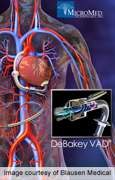For children with severe heart failure, use of a ventricular assist device as a bridge to heart transplantation is associated with improved survival compared with extracorporeal membrane oxygenation, according to a study published in the Aug. 9 issue of the New England Journal of Medicine.
(HealthDay) -- For children with severe heart failure, use of a ventricular assist device as a bridge to heart transplantation is associated with improved survival compared with extracorporeal membrane oxygenation (ECMO), according to a study published in the Aug. 9 issue of the New England Journal of Medicine.
Charles D. Fraser Jr., M.D., from Texas Children's Hospital in Houston, and colleagues conducted a prospective, single-group trial of a ventricular assist device designed as a bridge to heart transplantation for children. Forty-eight children, aged 16 years or younger, were divided into two cohorts of 24 according to body-surface area. Survival was compared with two propensity-score-matched historical control groups who underwent ECMO.
The researchers found that, for participants in cohort 1 (body-surface area <0.7 m²), at 174 days the median survival time had not been reached, while the median survival time was 13 days in the matched ECMO group. In cohort 2 (body-surface area 0.7 to <1.5 m²) the median survival was 144 days, compared with 10 days in the matched ECMO cohort. Adverse events included major bleeding (42 percent in cohort 1 and 50 percent in cohort 2), infection (63 and 50 percent, respectively), and stroke (29 percent in both cohorts).
"In conclusion, we found that a ventricular assist device available in several sizes for use in children as a bridge to heart transplantation was associated with a significantly higher rate of survival, as compared with ECMO," the authors write. "Serious adverse events, including infection, stroke, and bleeding, occurred in a majority of the study participants."
The study was funded in part by Berlin Heart Inc.; several authors disclosed financial ties to pharmaceutical companies and/or Berlin Heart.
More information:
Full Text (subscription or payment may be required)
Editorial (subscription or payment may be required)
Journal information: New England Journal of Medicine
Copyright © 2012 HealthDay. All rights reserved.


















